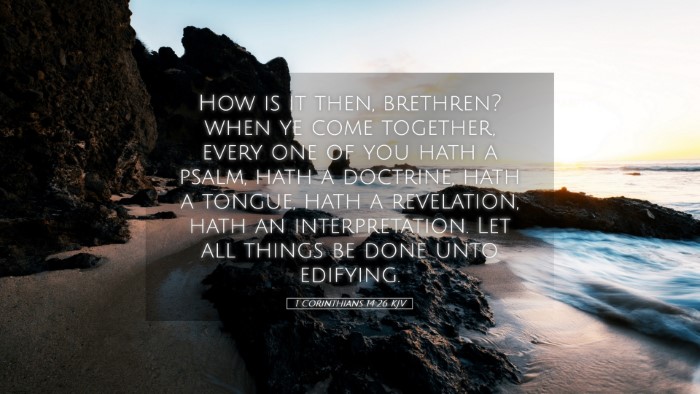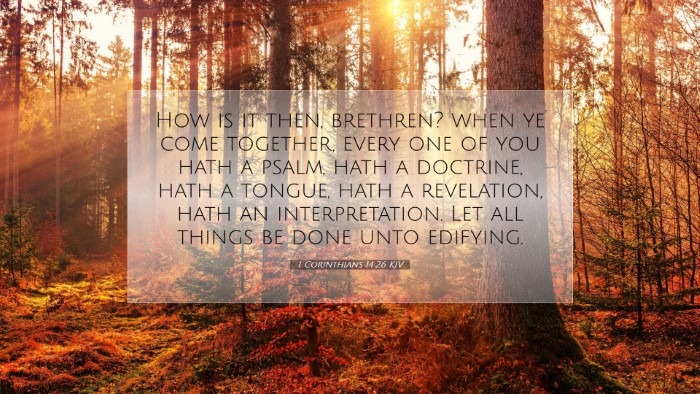Commentary on 1 Corinthians 14:26
Verse: "How is it then, brethren? when ye come together, every one of you hath a psalm, hath a doctrine, hath a tongue, hath a revelation, hath an interpretation. Let all things be done unto edifying."
Introduction
This verse from 1 Corinthians 14:26 encapsulates Paul's extensive teachings on the proper conduct during meetings of the church and emphasizes the importance of edification in communal worship. Paul addresses the Corinthian church, which was experiencing chaos and disorder during their gatherings, leading him to provide systematic guidance for orderly worship.
Contextual Background
The Corinthian church was plagued by divisions, confusion, and misuses of spiritual gifts. In this chapter, Paul rebukes the disorder and presents a framework for worship that prioritizes clarity and mutual upbuilding in the faith. This verse directly follows Paul's instructions on the utilization of spiritual gifts and reveals the expectation that each member contributes to the collective spiritual nourishment.
Insights from Commentaries
Matthew Henry's Commentary
Matthew Henry interprets this verse within the context of the church's gatherings, where every member has a role to play. He emphasizes that "every one of you" signifies the active participation of the congregation in worship. Henry warns against an overly hierarchical structure within the church; instead, he advocates for a balance where various contributions are made for the common good.
He highlights the types of contributions mentioned: psalms, doctrines, tongues, revelations, and interpretations. Each of these serves to build up the church and reminds us that worship is not merely a passive experience. Henry asserts that "Let all things be done unto edifying" serves as a guiding principle for evaluating worship practices. If an action does not contribute to the edification of the body, it detracts from the purpose of gathering.
Albert Barnes' Notes on the Bible
Albert Barnes provides an insightful breakdown of each element listed in the verse. He notes that a "psalm" refers to songs or hymns typically drawn from the Old Testament. In contrast, "doctrine" pertains to teaching—presumably divine truths derived from Scripture. Barnes draws attention to "tongue," observing that it may relate to the speaking in tongues, a contentious issue in Corinth, indicating a need for interpretation for the benefit of the assembly.
His analysis reveals Paul's intention for settings of worship to be lively yet grounded in teachings that glorify God. Barnes cautions against confusion, urging that the focus must remain on clarity and mutual understanding. He stresses that the edification of the church should be the supreme objective, as the spirit within worship should be one of encouragement, instructiveness, and building one another up in faith.
Adam Clarke's Commentary
Adam Clarke emphasizes the communal aspect of worship inherent in the verse. He suggests that Paul's reference to individual contributions underlines the concept of the "priesthood of all believers." Each member’s gifts and insights are vital for the spiritual health and growth of the church. Clarke critically examines the interpretive elements and notes their significance in enabling understanding among attendees—especially with the aspect of interpretation linked to speaking in tongues.
Clarke notes the importance of orderliness in the exercise of gifts. He proposes that there should be a framework to prevent chaos: suggesting that contributions should occur in an orderly fashion, where the clarity of communication takes precedence over the form and spontaneity of the contributions. He reiterates the focus on edification, suggesting that every gift in use must aim towards uplifting the church body rather than serving personal ambition or display.
Theological Implications
This verse raises several theological implications regarding worship practices in contemporary settings:
- Participation in Worship: In light of Paul's admonition, every church member is encouraged to actively engage in worship. This affirms the belief in the equality of believers before God, where each has a contribution to make towards collective worship, thereby affirming the communal nature of faith.
- Order at Church Meetings: The emphasis on orderly conduct is a reminder that church gatherings should not devolve into chaos. Respect for one another’s contributions leads to a constructive and spiritually enriching experience.
- Purpose of Edification: All activities in worship must be purpose-driven, aiming to glorify God and edify the church. This principle is vital in evaluating the effectiveness of church practices and community behaviors.
Conclusion
1 Corinthians 14:26 serves as a critical framework for understanding the nature of worship within the church. Drawing from insights in the commentaries by Matthew Henry, Albert Barnes, and Adam Clarke, it becomes clear that Paul's guidance promotes a structure where all believers can contribute their gifts while ensuring that the ultimate aim remains centered on the edification of the body of Christ. Pastors, theologians, and scholars can derive valuable lessons from this text, emphasizing that worship should be participatory, organized, and fundamentally focused on building up the church community.


